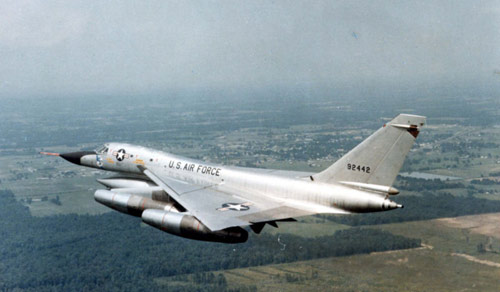B-58 Hustler
Summary
| Category | Bomber |
| Origin country | 🇺🇸 United States |
| Manufacturer | Convair |
| First flight | 11 November 1956 |
| Year introduced | 1960 |
| Number produced | 116 units |
| Average unit price | $18 million |
Description
The Convair B-58 Hustler's development began with the Generalized Bomber Study (GEBO II) in February 1949, issued by the Air Research and Development Command (ARDC) seeking a supersonic, long-range bomber aircraft. Multiple contractors submitted bids, including Boeing, Convair, Curtiss, Douglas, Martin, and North American Aviation. Convair's initial FZP-110 proposal featured a delta-wing, a two-place cockpit, and three General Electric J53 turbojet engines, with consumables stored in a large external pod. A revised FZP-016 proposal followed, deleting the third engine, increasing thrust, and adding a third crew member. The USAF chose Boeing's MX-1712 and Convair's MX-1626 designs for initial study. Convair refined its design, designated MX-1964, by replacing the two large J53 engines with four smaller J79s optimized for supersonic flight and applying the area rule principle. In August 1952, Convair's design was judged superior. In December 1952, Convair was chosen to meet new requirements and, in February 1953, the USAF issued a contract for Convair's design, designated B-58. Under this arrangement, Convair acted as the prime contractor responsible for all program elements. The contract was modified to build two XB-58 prototypes, 11 YB-58A preproduction aircraft, and 31 mission pods. The first prototype, serial number 55-660, was rolled out on 31 August 1956 and made its maiden flight on 11 November 1956. A total of 116 B-58s were produced - 30 trial aircraft and 86 production B-58A models. The final B-58 was delivered in October 1962.
The Convair B-58 Hustler featured a large delta wing with a leading-edge sweep of 60°, a configuration chosen to achieve high speeds. It was powered by four General Electric J79-GE-1 turbojet engines. The sizable wing resulted in relatively low wing loading and contributed to its suitability for low-altitude, high-speed flight. To protect against the heat generated while cruising at Mach 2, the crew compartment, wheel wells, and electronics bay were pressurized and air conditioned. The B-58 also featured extensive application of aluminum honeycomb panels, bonding outer and inner aluminum skins to a honeycomb of aluminum or fiberglass. The inlets used moving conical spikes, positioned fully aft on the ground and at low speeds to maximize air intake, then driven forward while flown at high speeds to minimize the annular gap.
The B-58's offensive armament typically comprised a single nuclear weapon, along with fuel tanks, housed within a streamlined MB-1C pod situated under the fuselage. Persistent issues with fuel leakage led to the MB-1C's replacement by the two-component pod (TCP). The TCP design positioned the nuclear weapon in an upper section, while the lower fuel component could be independently jettisoned, allowing optimization for fuel efficiency or enabling a reduced-profile weapon load in emergency situations. From 1961 to 1963, the B-58 fleet was retrofitted with two tandem stub pylons under each wing root, adjacent to the centerline pod, enabling carriage of B43 or B61 nuclear weapons, for a total of five nuclear weapons per aircraft. Although the USAF explored conventional strike missions, the B-58 was not equipped to carry conventional bombs. A photo reconnaissance pod, the LA-331, was also fielded. Defensive armament consisted of a single 20 mm (0.79 in) T-171E-3 rotary cannon with 1,200 rounds of ammunition in a radar-aimed tail barbette, remotely controlled by the Emerson MD-7 automated radar fire-control system. Maximum weapons load was 19,450 pounds (8,820 kg).
On August 1, 1960, the B-58 was declared operational and demonstrated superior performance compared to Boeing B-47 Stratojets and B-52 Stratofortresses in SAC's annual Combat Competition, excelling in both high and low-level radar bombing. Two SAC bomb wings operated the B-58 during its service: the 43rd Bombardment Wing at Carswell AFB, Texas, and later Little Rock AFB, Arkansas, and the 305th Bombardment Wing at Bunker Hill AFB (later Grissom AFB), Indiana. As high-altitude Soviet surface-to-air missiles became a significant threat, the B-58 was forced to operate at low altitudes, negating its high-speed performance and reducing its range, ultimately leading to its retirement in January 1970. Sustainment cost for the fleet was a factor in Secretary of Defense Robert McNamara's decision regarding its viability as a weapon system. The B-58 was replaced by the FB-111A, an aircraft designed for low-altitude attack, equipped for conventional weapons carriage, and intended to be less expensive to produce and maintain.
Main Variants:
-
XB-58: Prototype version with two aircraft built for design testing and refinement.
-
YB-58A: Eleven pre-production aircraft used for further evaluation prior to full production.
-
B-58A: The primary production variant, a three-seat medium-range strategic bomber.
-
TB-58A: Eight YB-58A aircraft converted for pilot training.
-
NB-58A: One YB-58A used as a testbed for the General Electric J93 engine.
Technical specifications
| Version: B-58A | |
|---|---|
| Crew | 3 members |
| Operational range | 2,800 km (1,740 mi) |
| Maximum speed | 2123 km/h (1319 mph) |
| Wing area | 143.3 m² (1542.5 sqft) |
| Wingspan | 17.3 m (56.8 ft) |
| Height | 8.9 m (29.2 ft) |
| Length | 29.5 m (96.8 ft) |
| Service ceiling | 19,324 m (63,399 ft) |
| Empty weight | 25,200 kg (55,556 lbs) |
| Max. takeoff weight | 80,240 kg (176,899 lbs) |
| Climb rate | 88.0 m/s (288.7 ft/s) |
| Powerplant | 4 × turbojets General Electric J79-GE-5A delivering 4400 kgp, up to 7076 kgp with afterburner |
Current operating countries
All operators
Armament
Bombs payload:
- Thermonuclear B43 Mod 1
- Thermonuclear B61

